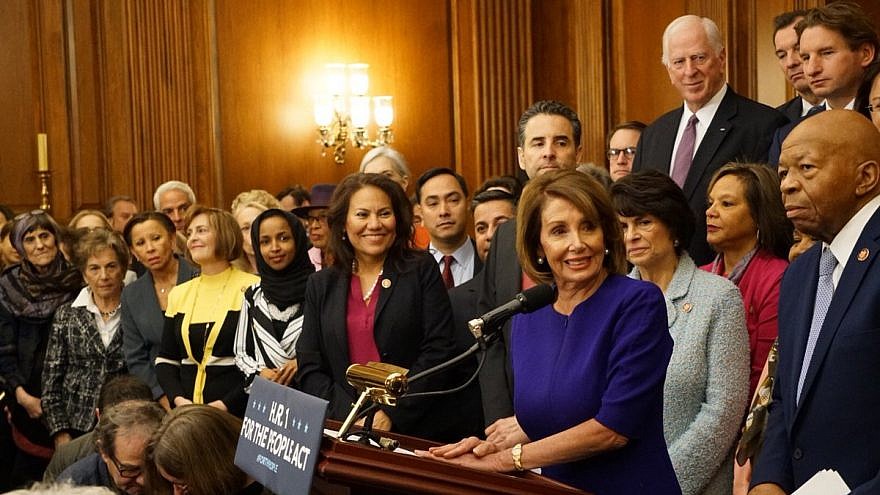The Democratic Party has long been viewed by most Jewish Americans as its political home. Influenced by the Jewish people’s long history of persecution, urban lifestyle and generally liberal political outlook, American Jews are some of the most reliable Democratic voters with nearly three of out four Jews supporting Democratic presidential candidates in recent elections.
Recently, however, the Democratic Party has begun a demographic and political transformation as increasing numbers of minorities and progressive voters—many spurred on by their opposition to U.S. President Donald Trump—have joined the party ranks. While polls show that most American Jews oppose the president and identify with progressive causes, the politics of intersectionality—on display over anti-Semitism controversy among Women’s March leaders, as well as anti-Semitism among new members of Congress, such as Reps. Ilhan Omar (D-Minn.) and Rashida Tlaib (D-Mich.)—may start to undermine the Jewish allegiance to the Democratic Party.
Following a vote in the House last Thursday, Trump weighed in on the matter, saying that the Democratic Party has become “anti-Israel” and “anti-Jewish.”
The next day came new remarks from the president at Mar-a-Lago in Florida to Republican donors, saying “the Democrats hate Jewish people.”
On Tuesday, following a segment on Fox & Friends highlighting a new advocacy group called “Jexodus” that encourages Jewish millennials to leave the Democratic Party, Trump again rehashed his claims, saying on Twitter: “We saw a lot of anti-Israel policies start under the Obama Administration, and it got worsts & worse. There is anti-Semitism in the Democratic Party. They don’t care about Israel or the Jewish people.”
“It’s a silly statement—most Jews are Democrats, and Democrats have a long history of supporting Israel, of being nice to the Jewish people and of fighting bigotry,” presidential historian Gil Troy told JNS. “But don’t you just wish that last week had ended differently, with a clear, emphatic statement by Democrats singling out anti-Semitism as a pernicious hatred, rather than burying their statement in broad, politically correct brushstrokes, making them vulnerable to Trump’s potshots?”
However, he continued, “I would also say that while no, it’s not true that Democrats hate Jewish people, Democrats showed that as a party, they don’t hate the haters of Jewish people enough. They also showed last week that as a party, they love some of their people too much and will excuse them for hating Jewish people—and that is inexcusable.”
‘They need to take a strong stand now’
Yet prominent Jewish Democrats did not mince their words criticizing Trump for attempting to drive a wedge between the Democratic Party and its Jewish supporters.
“Is that the same person who said there were ‘very fine people’ on both sides in Charlottesville?” rhetorically asked Democratic strategist and former Clinton White House communications director Ann Lewis.
Democratic Majority for Israel CEO and president Mark Mellman echoed Lewis, who is a co-chair of the organization, saying that “having defended neo-Nazis in Charlottesville and slurred Jews, Latinos, African-Americans, women and others, this president has simply forfeited all credibility in talking about hating Jews.”
In a statement, Jewish Democratic Council of America executive director Halie Soifer said “President Trump may think he can present the American people with alternative facts, but these are lies, plain and simple. There is no loss of support for Democrats among the Jewish community.”
“Republicans have lost support among Jewish voters since President Trump took office,” she continued. “According to exit polling, support for Trump among the Jewish electorate in 2016 was 24 percent, while support for Republicans among Jewish voters in 2018 fell to 17 percent.”
However, 71 percent of Jews voted for Democratic nominee Hillary Clinton in 2016, a two percent increase from those who voted for Barack Obama in 2012, though much less than the 78 percent who cast a ballot for Obama in 2008.
In 2012, Republican nominee Mitt Romney received 30 percent of the Jewish vote whereas John McCain received 21 percent in 2008.
While there is no clear indication that the recent issues over anti-Semitism among some Democrats will erode support in the short term, it could harm the Democrats in the long term if the issue of anti-Semitism is not fully handled. In the United Kingdome, for instance, the Labour Party has been dealing with widespread anti-Semitism that has divided the party and caused several parliament members to leave in protest.
Troy said this episode with Omar and Trump should affect Jewish support for the Democratic Party: “With the real haters like Omar, with the cowardly sheep who went along and with the leadership—but Trumpophobia is so widespread and intense among most Jews that Democrats understand—most Jews feel they have nowhere else to go … but could it be that the Democrats just lost Florida in 2020?”
Trump won Florida, an electoral swing state where Jews comprise 3 percent of the state population, with 49.2 percent of the vote in the 2016 presidential election.
“We have been warning for years that there is a virulent anti-Semitic element in the liberal base of the Democratic Party,” Republican Jewish Coalition spokesperson Neil Strauss told JNS. “Over the past couple months, the American people have seen clearly what we have been warning them about. Elements of the Democratic Party hate Jews, and worse, a larger subset of Democrats enable the anti-Semites in their party because they fear losing votes and support.”
Rep. Ross Spano (R-Fla.) agreed with the RJC’s sentiment.
“I wouldn’t say that the Democrats generally hate Israel,” he told JNS. “But I think there is a growing faction within the Democratic Party that does. And I think that if the Democrats are going to get ahead on this issue, they need to take a strong stand now.”


























